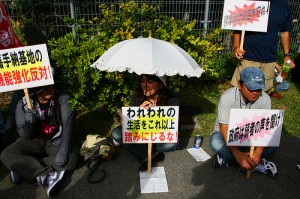Futenma (kanji: 普天間) is the name of the big American air base on Okinawa that has been the subject of much political controversy in recent years. The current Prime Minister of Japan, Yukio Hatoyama, has decided, under heavy, even overwhelming American pressure, including a personal visit by Secretary of State Hillary Clinton, to allow American forces to remain on Okinawa. The air base will be moved elsewhere on Okinawa and training partially distributed across Japan itself to relieve some of the pressure. Hatoyama made a public apology to Okinawa for failing to find a better alternative than the 2006 agreement he has now decided to honor.
When Hatoyama was elected, people in Okinawa, and Japan itself, expected a lot more from him than this. So, Hatoyama’s problem is that he looks like he came in giving the expectation that Okinawa wouldn’t host the future American airbase (whatever its form); but now, Okinawa must do just that. That’s why Hatoyama has made a heartfelt (his word) public apology.
In reading commentary about this, I came across this comment about words spoken by Hatoyama’s party’s secretary-general, Ozawa Ichiro.
Even more troublesome for the prime minister could be the opposition of Ozawa Ichiro, the secretary-general of his own party. Despite his professions to having no role in policymaking, Ozawa has not refrained from taking a hard line in calling for relocation of Futenma outside of Okinawa entirely. Responding to the latest agreement, Ozawa said it would be ‘difficult’ to secure the acquiescence of the Okinawan people (which, one would think, would be at least partly Ozawa’s job as secretary-general).
That last part represents a common disconnect when English readers look over Japanese thinking that has been translated into English. The writer feels that Ozawa is being disingenuous, undermining his own job in securing acquiescence by saying how ‘difficult’ (note the targeted use of quotations) it would be.
This is a basic misunderstanding. Ozawa is not being disingenuous in his own mind; nor is he understood that way when a Japanese person reads his comment.
In Japan, objective reality and objective facts are still understood to exist. An objective fact is a jijitsu (kanji: 事実). This combines “an intangible thing” with “fruit.” The fruit of something that is intangible, but real, is a fact. Not only a fact, but an objective fact, as opposed to the opinion of the speaker. The Japanese go through great trouble to differentiate the two.
In this case, sec-gen Ichiro stated the fact that securing the acquiescence of the people of Okinawa will be difficult. No kidding: Okinawans have paraded around signs with the character “怒” (which reads as “anger“). They are not happy. Regardless of whether Ichiro wants to convince them, it is a fact (a jijitsu) that this will be difficult.
In all probability, Ozawa Ichiro does not want to secure that acquiescence, job or no job, because he is personally disappointed by this decision. He may try to get Okinawans to acquiesce, or he may not, but he won’t be happy about it either way.
Rather than the way it looked like to that blog writer, Ichiro is not being disingenuous in saying this. Rather, in his own mind, and in the minds of Japanese readers, he is being completely honest about the situation. One might add, “honest to a fault,” because saying this might diminish his ability to use propaganda to gain acquiescence, but Futenma is a much-debated issue going back decades; minds are not going to change. Indeed, the very word acquiescence just means getting some limit to how much the people of Okinawa rebel against this.
Another problem: Hatoyama heads a coalition government. That coalition may not hold together under this pressure. Also, government officials in Okinawa can cause a lot of trouble if they do not acquiesce, too. Given the vulnerability of the Hatoyama administration, and the fact that even if Hatoyama hasn’t gone back on his word per se (he never guaranteed a result here), he has given up in the face of political pressure, all parties opposed to this can inflict a great deal of political pain. The effort to obtain acquiescence begins from a position of great weakness.
Because Ichiro did not present the routine bluster that is expected of Western politicians, he appears to English readers as stabbing his own party in the back. In his own mind, all he has done is spoken a jijitsu: that his party has stabbed itself in the foot. What he does beyond this point is, to him, a separate issue not directly related to this fact.
No, I don’t blame the writer on that blog for reading Ichiro’s words like he did. Rather, I’m saying that this is the predictable result of reading Japanese translated into English without understanding the thought process behind it. I’m pleased to use this as an opportunity to teach rather than simply point fingers.
photo credit: thechrisdavis

